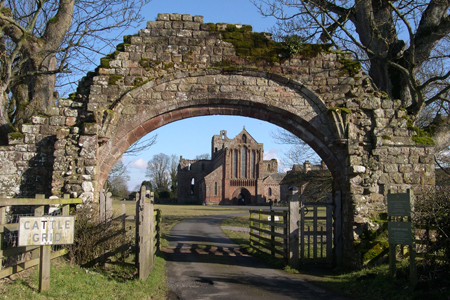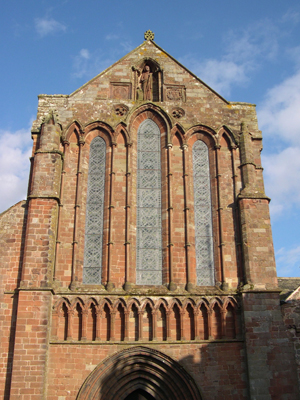| |
 |
 |
 |
| Comment on this report, or find other reports. |
 |
| Our Mystery Worshippers are volunteers who warm church pews for us around the world. If you'd like to become a Mystery Worshipper, start here. |
 |
| Find out how to reproduce this report in your church magazine or website. |
|
|
| 1946: St Mary
Magdalene, Lanercost, Cumbria, England |
 |
 |
 |
Mystery Worshipper:
Chris Teean.
The church:
St
Mary Magdalene, Lanercost, Cumbria, England.
Denomination:
Church of England, Diocese
of Carlisle.
The building:
The church stands in the grounds of Lanercost Priory, most of
which is now in ruins. Established in 1169 by Henry II as an
Augustinian monastery, the priory found itself in the middle
of turbulent border skirmishes between the English and the Scots
in the 14th century. After Henry VIII's dissolution of the monasteries,
most of its lead, timber and stone were carried away, the canons
were turned out, and valuables were confiscated. The priory
church was restored in the 19th century. The entrance through
a ruined gatehouse reveals a rather tall imposing west end with
distinctive long lancet windows above a grand doorway, surrounded
by multiple arches and columns. A niche containing a statue
of Mary Magdalene is placed at the top of this west front. The
present church has an asymmetrical interior consisting of the
original nave and north aisle. There is a sense of plainness
and simplicity as well as a feeling of enclosure, because the
side windows on the south side are very high. These are predominantly
plain with a delicate pattern, as are the splendid west windows.
The north aisle contains some exceptional 19th and 20th century
stained glass. There are many other items of interest mounted
on the walls, too numerous to list here. The plain altar consists
of a table with a brass cross, flanked by a pair of candles.
A chancel has been created by the addition of choir stalls,
together with the installation of a rather magnificent organ,
screened off on the north aisle.
The church:
St Mary Magdalene serves as an active parish church for a small
scattered rural community. Holy communion is celebrated most
Sundays and Wednesdays at this church and its partner church
at Walton, a few miles away. There is a Mothersí Union and they
have an active social calendar. They host classical concerts,
the highlight of which is a music festival every June. The last
vicar retired about a month ago so there is now an interregnum.
The churchwardens are hoping to appoint and install a new incumbent
within the next year.
The neighbourhood:
The priory lies in a rural location in the Irthing valley, about
12 miles north east of Carlisle and 14 miles south of the Scottish
border. It is within walking distance of Hadrianís Wall. Its
immediate neighbours are some holiday cottages, a shop and a
tearoom, all modern conversions from the disused Abbey farm.
Across the fields can be glimpsed the cricket ground and tiny
village of Lanercost.
The cast:
Commissioned Lay Ministers Jill Smith and Jo Kirk.
The date & time:
Sunday, 28 February 2010, 11.00am.
What was the name of the service?
The website stated it was Parish Communion; however, the newsletter
called it Family Service. At any rate, it was not a communion
service.
How full was the building?
It was encouraging to see about two dozen cars parked outside and there must have been about 70-80 people in the congregation Ė most on the elderly side and all muffled up against the elements, in thick coats and scarves.
Did anyone welcome you personally?
A very friendly lady greeted us the minute we stepped through
the door. Although it was a very cold day, she assured us we
would be warmer today than last Sunday when they ran out of
oil! She directed us to some ladies who greeted us with a cheerful
good morning and issued us all the literature we needed for
the service.
Was your pew comfortable?
It was a standard wooden pew topped with a long cushion, together with reasonably comfortable hassocks.
How would you describe the pre-service
atmosphere?
Cheerful, welcoming and fairly quiet. The organist was playing
quietly.
What were the exact opening words of the
service?
"Good morning and welcome to this service on the second
Sunday of Lent. Itís lovely to see you all."
What books did the congregation use during the
service?
Hymns Ancient and Modern, New Standard; Come and
Praise (published by the BBC); For All the Church Family
(order of service leaflet); and a newsletter giving times and
locations of services in the benefice, collect, readings and
gospel, and future diary dates.
What musical instruments were played?
A rather magnificent organ, originally built in 1880 by the
revered Thomas J Robson (organ builders by appointment to Her
Majesty the Queen) and rebuilt in 1923 by the London firm of
Gray and Davison. It was expertly played by Mr Jerry King.

Did anything distract you?
Although I had been told the heating was on, I donít think I
have ever been in such a cold church! I kept thinking about
those poor Augustinian canons all those years ago, shivering
as they went about their tasks in what must have been a cold
and draughty building. A gentleman and several ladies, all wearing
thick coats and scarves, sat in the choir stalls. Were they
wearing so many layers of clothes that they couldnít fit their
choir robes on top? I wondered. A lady dressed in heavy coat
and pink scarf went to the lectern and greeted us. I thought
she was probably one of the churchwardens. I was taken aback
when she started reading from the order of service leaflet,
and my frozen brain gradually registered that she was in fact
one of the lay ministers and was conducting the service in place
of a priest.
Was the worship stiff-upper-lip, happy clappy, or
what?
The lay minister in pink had a pleasant voice and she led the
congregation effortlessly through the opening prayer, the confession,
and the praise. The other lay minister, in a green scarf, was
equally eloquent as she read the gospel, a sermon, and the prayers
of intercession. The absence of a priest in a Church of England
service was a totally new experience for me, and I felt a sense
of shock when it dawned upon me that there would be no administration
of communion at this service. All one can say about the style
of worship was that it was dignified and efficient.
Exactly how long was the sermon?
8 minutes.
On a scale of 1-10, how good was the preacher?
7 – The lay minister spoke clearly with good diction but
it came over that she was delivering a reading rather than preaching
a sermon.
In a nutshell, what was the sermon
about?
It was about how we must put our trust in God. Just as a mother duck wants to protect her ducklings, Jesus tells us how he and his father want to care for us and protect us. It is easy for us to be tempted and forget to turn to God for help. We need to follow the good examples of Jesus, Paul and the apostles, and turn to God for guidance and support.
Which part of the service was like being in
heaven?
The sun shining through the clerestory windows reminded me that so many generations of Christians have worshipped in this house of God for over 800 years.
And which part was like being in... er... the other place?
I always thought the other place would be unbearably hot, but
now I realise that when parts of you become frostbitten, youíve
arrived!
What happened when you hung around after the service looking lost?
Several people chatted with us, including the ladies with the pink and green scarves. They seemed to be an amicable group.
How would you describe the after-service
coffee?
It was hot!
How would you feel about making this church your regular (where 10 = ecstatic, 0 = terminal)?
8 – I would certainly give it a try if I lived here. The
congregation appeared to be active and friendly. They seem to
have a positive attitude about their future with a new vicar
and even have plans to create a minster at Lanercost.
Did the service make you feel glad to be a
Christian?
Yes. There was an indescribable feeling of holiness about this hauntingly beautiful place.
What one thing will you remember about all this in seven days' time?
I donít think I will ever forget the sad image of the ruins
of the priory beyond the east window. |
|
|
 |
 |
 |
| We rely on voluntary donations to stay online. If you're a regular visitor to Ship of Fools, please consider supporting us. |
 |
 |
 |
| The Mystery Pilgrim |
 |
| One of our most seasoned reporters makes the Camino pilgrimage to Santiago de Compostela in Spain. Read here. |
 |
 |
 |
| London churches |
 |
| Read reports from 70 London churches, visited by a small army of Mystery Worshippers on one single Sunday. Read here. |
| |
|
|
|
|


